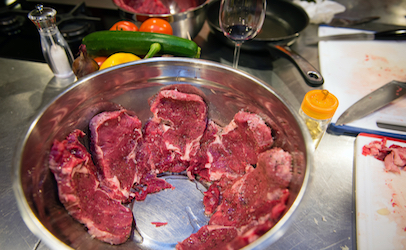USDA’s Food Safety and Inspection Service (FSIS) caught Texas Meat Packers in Fort Worth operating without inspection personnel being present last Saturday (March 24), causing a recall today (March 31) of beef products. FSIS discovered the operation on Friday (March 30) through a review of Texas Meat Packers records.
Owned by PFP Enterprises LLC, Texas Meat Packers has recalled approximately 7,146 pounds of raw beef products that were produced and packaged without the benefit of federal inspection, according to the U.S. Department of Agriculture’s Food Safety and Inspection Service
The frozen and fresh beef items were produced on both March 23-24, 2018. The following products are subject to recall:
5-lb. vacuum-packed frozen packages of “BEEF SKIRT DICED FOR TACOS,” with a case code of 1470 in the upper left-hand corner of the label and a packaging date of 03/24/18.
- 5-lb. vacuum-packed frozen packages of “PRESEASONED BEEF FOR FAJITAS,” with a case code of 36989 in the upper left-hand corner of the label and a packaging date of 03/24/18 and a use-by date of 03/23/19.
- Varying weights of vacuum-packed packages of fresh “USDA CHOICE ANGUS BEEF, FAJITA SEASONED STEAK, BEEF FLANK STEAK FOR FAJITAS,” a packaging date of 03/23/18 and 03/24/18, a use or freeze-by date of 04/18/18, and an item code of 567248261 in the upper left-hand corner of the case label.
- Varying weights of vacuum-packed packages of fresh “USDA CHOICE ANGUS, FAJITA SEASONED STRIPS, BEEF FLANK STRIPS FOR FAJITAS,” a packaging date of 03/24/18, and a use or freeze-by date of 04/18/18, and an item code of 567248253 in the upper left-hand corner of the case label.
The recalled products bear the establishment number “EST. 34715” inside the USDA mark of inspection. These items were shipped to institutional and retail locations in Alabama, Arkansas, Indiana, Louisiana, Mississippi, Missouri, Oklahoma, Texas, and Wisconsin.
The recalled beef has not yet made anyone ill. Anyone concerned about a reaction should contact a healthcare provider.
FSIS is concerned that some product may be frozen and in consumers’ freezers. Consumers who have purchased these products are urged not to consume them. These products should be thrown away or returned to the place of purchase.
FSIS routinely conducts recall effectiveness checks to verify recalling firms notify their customers of the recall and that steps are taken to make certain that the product is no longer available to consumers. When available, the retail distribution list(s) will be posted on the FSIS website.
from Food Recalls – Food Safety News https://ift.tt/2Ja8JeQ

 The Canadian Food Inspection Agency posted the first notice on March 18. It was for ground beef from
The Canadian Food Inspection Agency posted the first notice on March 18. It was for ground beef from  The CDC his urging the public to avoid eating certain brands of dried coconut because they are linked to a multi-state outbreak of Salmonella poisoning that has been ongoing since September 2017.
The CDC his urging the public to avoid eating certain brands of dried coconut because they are linked to a multi-state outbreak of Salmonella poisoning that has been ongoing since September 2017. “Put it in a sealed bag in the trash so that children, pets, and other animals can’t eat it. Wash and sanitize drawers or shelves in
“Put it in a sealed bag in the trash so that children, pets, and other animals can’t eat it. Wash and sanitize drawers or shelves in  Illnesses started on dates ranging from Sept. 22, 2017, to Feb. 26, 2018. Ill people range in age from 1 to 73 years, with a median age of 40. Sixty-seven percent are female.
Illnesses started on dates ranging from Sept. 22, 2017, to Feb. 26, 2018. Ill people range in age from 1 to 73 years, with a median age of 40. Sixty-seven percent are female.

